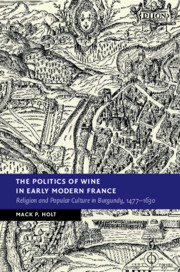
- Cited by 5
-
Cited byCrossref Citations
This Book has been cited by the following publications. This list is generated based on data provided by Crossref.
Reinburg, Virginia 2019. Storied Places.
Sussman, Sarah 2020. Recent Books and Dissertations on French History. French Historical Studies, Vol. 43, Issue. 2, p. 324.
Garcia, Jean-Pierre 2020. Les Climats en Bourgogne : enjeux et évolutions d’un paysage viticole devenu patrimoine culturel. Pour, Vol. N° 237-238, Issue. 1, p. 203.
HAMILTON, TOM 2021. A SODOMY SCANDAL ON THE EVE OF THE FRENCH WARS OF RELIGION. The Historical Journal, Vol. 64, Issue. 4, p. 844.
Michalewicz, Nathan 2022. Friends, Enemies, and Diplomacy in Constantinople: The French Embassy of Jacques de Germigny (1579–84). The Sixteenth Century Journal, Vol. 53, Issue. 4, p. 989.
- Publisher:
- Cambridge University Press
- Online publication date:
- August 2018
- Print publication year:
- 2018
- Online ISBN:
- 9781108620017
- Subjects:
- Area Studies, European History after 1450, History, Religion, European Studies, Church History
- Series:
- New Studies in European History




